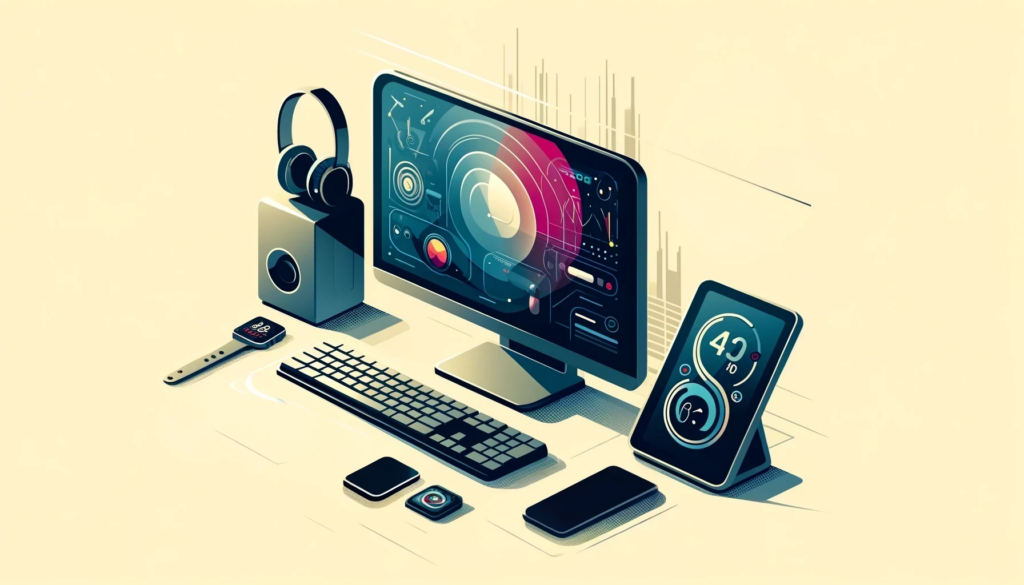Technology in Everyday Life

We use technology every day. Our phones wake us up. They are our alarms. We then check the weather. Our phones tell us if it is sunny or rainy. We use apps to read the news. It is easy to know what happens in the world.
We take buses or trains to work. Technology helps them run on time. We buy tickets with our phones. In shops, we pay with cards, not just cash. Computers help shopkeepers track what they sell. This makes shopping quick and easy.
At home, we use technology to relax. We watch shows on our tablets. We listen to music on our phones. We even read books on screens. Some people play games too. They use computers or consoles to play.
We talk to friends with technology. We send messages or make calls. We use the internet to talk with people far away. Our phones help us find places. They have maps that give us directions. We never get lost now.
Even in the kitchen, we use technology. We cook with electric ovens. We keep food cold in fridges. Some people have machines to wash dishes. This saves us time.
Technology is everywhere. It makes our lives easier. We do many things faster. We can do more in less time. Technology is a big part of our daily life.
Text Analysis
CEFR Level Card
General Level: A2.1
Vocabulary: A1.5
Verb Forms: A1.0
Sentences: A2.0
Wordlist
alarm NOUN B1 x1
Definition (En):
- fear resulting from the awareness of danger
n. a device that signals the occurrence of some undesirable event
n. an automatic signal (usually a sound) warning of danger
v. warn or arouse to a sense of danger or call to a state of preparedness
console NOUN B2 x1
Definition (En):
- a scientific instrument consisting of displays and an input device that an operator can use to monitor and control a system (especially a computer system)
n. an ornamental scroll-shaped bracket (especially one used to support a wall fixture)
shopkeeper NOUN B2 x1
Definition (En):
- a merchant who owns or manages a shop
track VERB B2 x1
Definition (En):
- a pair of parallel rails providing a runway for wheels
n. an endless metal belt on which tracked vehicles move over the ground
n. (computer science) one of the circular magnetic paths on a magnetic disk that serve as a guide for writing and reading data
n. a groove on a phonograph recording
Phrases and Idioms
PHRASE | COUNT | SENTENCES |
in the world | 1 |
|
Reading Comprehension Exercises
True / False
- Our mobile devices are used as alarm clocks to wake us up.
- To find out if it’s cloudy or not, we look outside the window.
- We can buy bus or train tickets using our phones.
- People only use cash to pay for things in stores.
- While traveling, we can’t tell if the bus or train is on schedule.
- We use tablets to watch TV shows at home.
- Computers are never used for playing games.
- We need maps made of paper to find our way because our phones don’t have maps.
- Cooking is done with machines like electric ovens, and we keep edibles cool in refrigerators.
- People must spend a lot of time washing dishes because there are no machines to do it.
It's Your Turn!
Create your multiple choice questions for this reading lesson just in seconds!
Step 1: Click the button to copy the reading text
Step 2: Go to Exercise Creator
Step 3: Paste the reading text
Select question type (Multiple Choice)
Click “Create” and your questions will be ready in seconds!
Short Answer Questions
- What do our phones do in the morning?
- How do we find out if it is sunny or rainy?
- What do shopkeepers use to track what they sell?
- What technology helps buses or trains run on time?
- What do we use to buy tickets for buses or trains?
- How can we pay in shops apart from using cash?
- What do we use at home to relax?
- How do we talk to people who are far away?
- What saves us time in the kitchen?
- How has technology affected our ability to do things?
Multiple Choice Cloze
We use technology every day. Our phones wake us up. They are our ___1___. We then check the ___2___. Our phones tell us if it is sunny or rainy. We use apps to read the news. It is easy to ___3___ what happens in the world.
We take ___4___ or trains to work. Technology helps them run on time. We buy tickets with our phones. In shops, we ___5___ with cards, not just cash. Computers help shopkeepers track what they sell. This makes shopping ___6___ and easy.
At home, we use technology to relax. We watch shows on our ___7___. We listen to music on our phones. We even read books on ___8___. Some people play games too. They use computers or ___9___ to play.
We talk to friends with technology. We send ___10___ or make calls. We use the internet to talk with people far away. Our phones help us find places. They have maps that give us ___11___. We never get lost now.
Even in the kitchen, we use technology. We cook with electric ___12___. We keep food cold in ___13___. Some people have machines to wash dishes. This saves us time.
Technology is everywhere. It makes our lives easier. We do many things faster. We can do more in less time. Technology is a big part of our daily life.
1) A. alarms B. cameras C. lights D. batteries
2) A. weather B. time C. news D. temperature
3) A. know B. understand C. read D. see
4) A. buses B. cars C. bikes D. scooters
5) A. talk B. deal C. play D. pay
6) A. quick B. slow C. expensive D. difficult
7) A. phones B. tablets C. computers D. televisions
8) A. screens B. paper C. walls D. boards
9) A. phones B. laptops C. consoles D. radios
10) A. emails B. packages C. messages D. letters
11) A. directions B. problems C. rules D. jokes
12) A. grills B. ovens C. stoves D. microwaves
13) A. shops B. wallets C. fridges D. cabinets
Writing Exercise
Writing Exercise
Q. Write one paragraph about how you use technology every day, including specific examples of how it helps you.
Answer Key
True / False Answers
- True
Explanation: The text says phones are used as alarms, which is another way of saying they wake us up like alarm clocks.
(“Our phones wake us up. They are our alarms.”)
- False
Explanation: The text states that phones give us the weather information, not by looking outside.
(“Our phones tell us if it is sunny or rainy.”)
- True
Explanation: The text clearly states that tickets can be purchased with phones.
(“We buy tickets with our phones.”)
- False
Explanation: The text says that payment can be made with cards and not only with cash.
(“In shops, we pay with cards, not just cash.”)
- False
Explanation: The text indicates that technology helps us know if public transportation is on time.
(“Technology helps them run on time.”)
- True
Explanation: The text explicitly mentions that shows are watched on tablets.
(“We watch shows on our tablets.”)
- False
Explanation: The text says that computers are used for playing games.
(“Some people play games too. They use computers or consoles to play.”)
- False
Explanation: According to the text, our phones do have maps that provide directions.
(“They have maps that give us directions.”)
- True
Explanation: The text states we use electric ovens for cooking and fridges to keep food cold.
(“We cook with electric ovens. We keep food cold in fridges.”)
- False
Explanation: The text mentions that there are machines available to wash dishes, which saves time.
(“Some people have machines to wash dishes.”)
It's Your Turn!
Create your multiple choice questions for this reading lesson just in seconds!
Step 1: Click the button to copy the reading text
Step 2: Go to Exercise Creator
Step 3: Paste the reading text
Select question type (Multiple Choice)
Click “Create” and your questions will be ready in seconds!
Short Answer Answers
- Wake us up.
Explanation: The text directly states that phones are used as alarms to wake us up in the morning.
(“Our phones wake us up.”)
- Our phones tell us.
Explanation: The text says that we use our phones to check the weather, which tells us if it’s sunny or rainy.
(“Our phones tell us if it is sunny or rainy.”)
- Computers.
Explanation: The text mentions that shopkeepers use computers to help them track their sales.
(“Computers help shopkeepers track what they sell.”)
- Technology.
Explanation: The text implies that technology is used to help public transportation like buses or trains to be punctual.
(“Technology helps them run on time.”)
- Our phones.
Explanation: According to the text, we use our phones to purchase tickets for transportation.
(“We buy tickets with our phones.”)
- With cards.
Explanation: The text shows that besides cash, we have the option to pay using cards in shops.
(“In shops, we pay with cards, not just cash.”)
- Technology.
Explanation: The text states that we use various forms of technology to relax at home, such as watching shows or listening to music.
(“At home, we use technology to relax.”)
- Use the internet.
Explanation: The text mentions that to communicate with people who are not nearby, we use the internet.
(“We use the internet to talk with people far away.”)
- Machines to wash dishes.
Explanation: The text describes that using dishwashing machines saves time when doing kitchen work.
(“Some people have machines to wash dishes.”)
- We can do more in less time.
Explanation: The text explains that due to technology, we are able to accomplish more activities in a shorter timespan.
(“We can do more in less time.”)
Multiple Choice Cloze Answers
- A
Explanation: The correct word is ‘alarms’, which wakes people up.
- A
Explanation: The correct word is ‘weather’; we check if it’s sunny or rainy.
- A
Explanation: The correct word is ‘know’, relating to being informed about the world.
- A
Explanation: The correct word is ‘buses’; the context is public transport to work.
- D
Explanation: The correct word is ‘pay’; it is about transactions in shops.
- A
Explanation: The correct word is ‘quick’; technology speeds up shopping.
- B
Explanation: The correct word is ‘tablets’; it’s a device for watching shows.
- A
Explanation: The correct word is ‘screens’; it refers to digital reading.
- C
Explanation: The correct word is ‘consoles’; these are used to play games.
- C
Explanation: The correct word is ‘messages’; it is a way to communicate.
- A
Explanation: The correct word is ‘directions’; maps provide this information.
- B
Explanation: The correct word is ‘ovens’; used for cooking with technology.
- C
Explanation: The correct word is ‘fridges’; they keep food cold.
Your Own Reading Lesson
Create Your Own Lesson with Cathoven AI
You can create your own reading lesson based on your interests or those of your students!
Go to;
Type the topic you are interested in, select the level and genre you are looking for, and click Generate!
Paste the reading text you generated and get a detailed analysis of your text.
Select the type of exercise, paste the reading text, and click Create!
Your reading lesson is ready!





